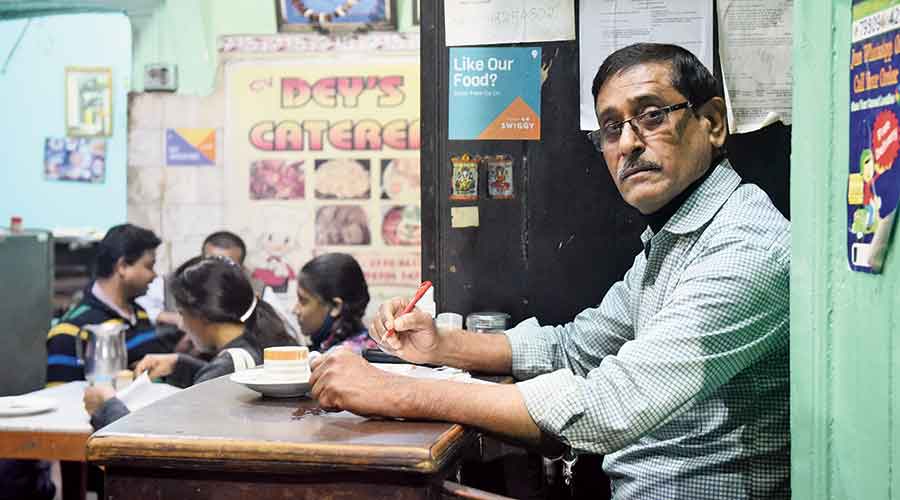At 11.30am on a late January day the inside of this landmark “cabin restaurant” in Sovabazar Street looks a bit like a battlefield gearing up. Inside Dhiren Cabin, the floor is strewn with chairs — small, wooden ones with sun mica seats, the tables are old-world, stone tops on wooden frames, and all surfaces are covered with heaps of filleted fish, minced mutton and pieces of chicken. (“Country chicken,” you are informed.)
People come from far for the fish pakoras here: chunks of flaky fish crisp-fried in a light batter that crunches gently in your mouth, spreading joy. The fish fries, fish fingers and the mutton braised cutlets close rivals.
The restaurant opens at 4.30. So around noon the seven or eight men are readying the stuff on a war-footing. Three of them belong to the family that owns the small two-room restaurant, boasting of two “cabins” in the outer room. The rest of the men are employees who do everything: cooking, cleaning, serving the food and getting the fish and meat cleaned, breaded and coated.
Outside the late morning market in the street is drawing to a noisy close. Vegetables, fruits and all kinds of fish, spread on blue plastic sheets, are choking the street, even as a swarm of vehicles is trying to push its way through the remainder of the street, drowning your voice. Even as you stand inside Dhiren Cabin, the street seems to come in. Everything, inside, outside, is frantic.
Yet the restaurant stands still in its own time, retaining its distinction, dignity, and a legacy, with no concession to contemporary “cool”. Every evening, its old hand-painted signboard beckons you into a different world. Apart from the delight of the fish pakoras, fish fingers and the occasional pudding, on offer is the pleasure of sitting in the cabins, being attended briskly and kindly by a handful of men not in uniform and being served tea in those tiny ceramic cups and saucers that come with small motifs and have disappeared more or less from sight. And being remembered. “You had a fish fry and fish pakoras last time, didn’t you?” you are asked.
“We have always resisted fast food,” says Prabir Kumar Dey, 63, one of the proprietors of the restaurant. No roll or chow mien ever. Dey sits behind the counter, running the restaurant with his three brothers, Mritunjoy, Biren and Tapan Kumar.
Dhiren Cabin was established by Dhiren Dey, their father, in 1938. Then it was only a “kitchen”.
“My father sold tea, biscuits and breakfast items at first,” says Dey, the third among the brothers. The family comes from north Calcutta and still lives there. This part of the city takes special pride in its savoury snacks, as it does in its sweets. Both constitute revered traditions.
Dhiren had a passion for the savoury. Now, within the savoury, “chop cutlet” is another distinct tradition, but this too has two genres. One is the heavily Bengalified version that opts for spicy, deeply coated fries. The other tries to hold on to the less fiery “sahebi” flavours. “Chop cutlets”, after all, were given to us by the British, though we have made them our own.
Dey’s father did not want to smother his creations with spices or arrowroot. He began to sell moglai parota and kabiraji, but kept the flavours light. As his business grew, the restaurant, from a tiny kitchen, expanded to two rooms. After his death in 1972, his sons took over, though they had been involved from earlier.
“I had joined the business in 1970,” says Dey, who could not continue his studies after the school final examination. “But we have preserved what our father taught us. Then we innovated, keeping our style,” says Dey. Thus was born doi chicken, another signature dish at Dhiren Cabin, as also the blockbuster fish pakoras. Biren, the second brother, also a regular at the restaurant. adds that the pudding, available mostly in summer, is unique, as it contains chhana (cottage cheese), which is usually used in making sandesh. And sometimes the pudding is made with a duck egg.
Small adjustments have been made to recipes. Only the braised cutlet was previously made from meat from the ribs. Now regular mutton keema is used. Tradition, too, has to evolve.
But no change has been made to the structure. The two cabins have not been touched. “We only removed the curtains,” says Dey. The only attempt at decoration is a curved metal lampshade hanging above the cabins, painted over with the same green of the walls.
Dhiren Cabin remains the same, more or less, not only to conserve heritage, but also to continue the business. Because heritage is business, Dey and his brothers assert. “Our customers come here for the old ambience. This place would lose its charm if we changed anything,” says Dey.
Yet to maintain business, you lose out on business. “The other thing we have not changed much is the pricing,” says Dey. A plate of fish pakoras — four pieces — is priced at Rs 90. “But if we change the price people will stop coming here,” says Dey. Maybe sustainability is more important than profit.
“We will continue this business,” says Dey. He adds with some pride that the younger generation is interested in the family business. Dey’s son and his elder brother Biren’s son, an M.Com student and a W.B.C.S. aspirant respectively, do not mind the idea of working at the restaurant. They were there in the morning at the filleting of the fish.
Some good things persist.











